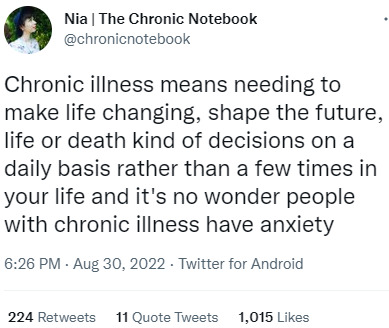#ChronicCondition
Text


11 notes
·
View notes
Text
Asthma Management: Breathe Easier at Renew Health Center

At Renew Health Center, approximately every person knows how it is to struggle with asthma. We offer a specialized asthma program, designed to provide you with quality care in controlling your asthma, preventing episodes, and improving your life.
Asthma is a long-term disease that affects the bronchi and characterized by inflammation and constriction of the airways, accompanied by whistling, difficulty in breathing, chest oppression, and coughing at night. These symptoms can be triggered by many causes such as allergies, respiratory tract infections, stress and so on. Asthma is a chronic condition which can cause symptoms only when it is not controlled by medication and by changing certain behaviors.
In a nutshell, we are a team of professionals who feel honoured to work with you in formulating the besetting treatment programme. Continued assistance is here so that we can help you to breathe freely and catch every moment.
Read more: Asthma Management
0 notes
Text
🌿🌸 Welcome to The Radical Scholar, where we explore comprehensive information on psoriasis and share home remedies to help alleviate its symptoms naturally.
Psoriasis, a chronic autoimmune disease affecting millions worldwide, can be managed through a combination of medical treatments and complementary home remedies.
Discover a range of natural solutions, from soothing topical remedies to dietary adjustments and lifestyle changes, that can support your psoriasis management plan.
Remember to consult with healthcare professionals and find a balance that works best for you.
Don't forget to sign up for our newsletter and delve into our blog series, "Decoding Psoriasis: Understanding the Complexity of a Chronic Skin Condition," for a deeper understanding.
Let's embark on this journey towards effective psoriasis management together! 💚✨
#TheRadicalScholar#PsoriasisAwareness#HomeRemedies#NaturalSolutions#ComprehensiveInformation#Wellbeing#ChronicCondition#Empowerment
0 notes
Text
Age-Related A1C Levels: Understanding Normal Blood Sugar Ranges
Hey there, health enthusiast! You’ve just stumbled upon the Well Health Hub, your go-to spot for top-tier tips and deep-dives into all things health! This time around, we’re chatting about blood sugar – it’s a bit like mastering a complex dance, so strap in!
From the nitty-gritty of what normal blood sugar levels look like, to why they’re your new best friend, and of course, the secrets to…

View On WordPress
#A1CTesting#BloodSugar#BloodSugarControl#ChronicCondition#DiabetesCare#diabetesmanagement#DiabetesPrevention#GlucoseLevels#HealthScreening#HemoglobinA1C
0 notes
Text
Yoga for Lymphedema
Yoga for Lymphedema: A Comprehensive Guide for Improved Well-being
Lymphedema is a chronic condition characterized by the accumulation of lymphatic fluid, causing swelling in various parts of the body. While there is no cure for lymphedema, several management strategies can help alleviate symptoms and improve quality of life. Among these strategies, yoga has gained recognition as a holistic…

View On WordPress
#ChronicBackPain YogaForHealing HolisticHealth MindBodyConnection PainManagement YogaTherapy BackPainRelief WellnessJourney YogaBene#ChronicCondition#HolisticApproach#LymphedemaManagement#YogaForHealing#YogaForLymphedema#YogaTherapy
0 notes
Text
Living with Chronic Disease: A Journey Through Hope and Perseverance by Idongesit Okpombor MD

Living with chronic disease can be a challenging and overwhelming experience. It can change every aspect of your life and create deep feelings of fear, discomfort, and uncertainty.
However, it's important to understand that living with chronic disease does not have to be a death sentence. For those who choose to navigate through the difficulties, it can be a journey of hope and perseverance.
This blog post will explore what it means to live with a chronic disease and the steps you can take to maintain a positive outlook on life. We'll cover everything from the physiological effects of chronic disease to the emotional toll it can take on your mental health.
Additionally, we'll look at different coping mechanisms that patients living with chronic diseases use to maintain hope and focus on the present.
We'll touch on the importance of taking care of your physical well-being, seeking support from loved ones, finding purpose in life, and setting realistic goals.
Accepting a New Reality
One of the key steps to living with chronic disease is accepting a new reality. This can be a difficult task, as it may involve giving up activities and routines that were once enjoyed, as well as adjusting to new limitations and uncertainties.
However, acceptance is an essential part of the journey through hope and perseverance. It allows you to redirect your energy towards finding new ways to adapt and manage your condition, rather than clinging to unrealistic expectations or continuously mourning what was lost.
While coming to terms with a chronic illness may be a challenging process, it is important to remember that it is a journey, not a destination. By accepting a new reality and approaching each day with a positive mindset, you can take steps towards finding joy and fulfilment in your life, regardless of your health challenges.
Openly Communicating With Your Care Team
Living with a chronic illness can be challenging, but openly communicating with your care team is one of the most important things you can do to manage your condition.
Your care team may include doctors, nurses, and other healthcare professionals who work together to support your treatment and care.
By communicating openly, you can help your care team understand your needs and goals, and work together to develop a personalised care plan that suits your unique situation. This may include discussing your symptoms, medications, lifestyle choices, and any concerns you may have about your condition.
By working together and staying informed, you can optimise your care and better manage your chronic disease over time.
Adapting to New Demands on Your Time
Living with a chronic disease can significantly alter your life and priorities, leading to new demands on your time. Adapting to these changes can be a challenging process, but it is essential for managing the disease effectively.
One approach that can help is to create a daily routine that incorporates the necessary treatments and self-management practises.
This might involve scheduling medication times, keeping track of daily symptoms, and arranging for transportation to medical appointments.
Additionally, it is crucial to communicate openly with family, friends, and colleagues about the changes in your life and your need for support. With dedication and flexibility, it is possible to find a new balance and adapt to the demands of living with a chronic disease.
Making Healthy Lifestyle Changes
Making healthy lifestyle changes can be intimidating for those suffering from chronic diseases, but it is a necessary step on the path to better health.
Making small changes to your everyday routine can have a significant impact on your overall wellbeing.
It's important to start with manageable changes, such as increasing physical activity by taking a 10-minute walk each day or swapping out processed snacks for fresh fruits and vegetables.
Gradually increasing the duration and intensity of physical activity and incorporating healthy food habits can lead to long-term success.
It's also important to prioritise adequate sleep and stress management techniques, as both can have a significant impact on overall health.
Remember, making healthy lifestyle changes is a process that requires patience, perseverance, and a supportive network that includes healthcare providers, friends, and family.
Developing Coping Strategies
Developing coping strategies is an essential aspect of living with chronic disease.
Coping strategies refer to the techniques and approaches that people use to manage the physical, emotional, and psychological challenges that arise from living with chronic disease.
Coping strategies can vary from person to person and even from day to day. It is important to identify strategies that work best for each individual, and this may involve experimentation and trial and error.
Some common coping strategies include stress reduction techniques, such as meditation or deep breathing exercises, creating a strong support system with family and friends, seeking professional counselling, and engaging in regular physical activity.
Developing coping strategies can help individuals maintain a positive outlook, reduce stress, and improve their overall well-being while living with chronic disease.
Connecting with Others Living with Chronic Disease
Connecting with others who are also living with chronic disease can provide powerful emotional and practical support. Sharing similar experiences and feelings with others can make you feel less alone and help normalise the challenges of living with chronic illness.
There are many ways to get connected, including joining in-person support groups, participating in online forums and chat rooms, and attending educational events or workshops.
These connections can also provide a wealth of valuable information, resources, and strategies for managing symptoms and coping with the emotional impact of chronic disease.
Remember, you don't need to go through this journey alone. Building a support network with other individuals who understand what you are going through can be a vital aspect of living with chronic disease.
Staying Informed About Your Condition
Staying informed about your condition is an integral part of managing chronic disease.
Healthcare providers are the primary source of information, but there are also several other reliable sources of information available.
Make sure to regularly consult with your healthcare team and ask questions. They can provide you with the latest updates and developments in treatment options and advise you of lifestyle changes that can have an impact on your condition.
Additionally, there are many reputable resources, such as online articles, support groups, and community forums, that can provide valuable information and support.
Remember, it is crucial to prioritise staying informed about your condition and to constantly evaluate and adjust your strategies for managing it. This will empower you to take an active role in your healthcare and make informed decisions to improve your quality of life.
Seeking Support from Family and Friends
Living with a chronic disease can be challenging and emotionally draining, but seeking support from loved ones can be invaluable.
Family and friends can provide a source of emotional support, motivation, and encouragement. It is important to have a supportive network of people who understand the struggles they face.
This can come in the form of physical support, such as assistance with daily tasks or transportation to medical appointments, as well as emotional support, such as being a listening ear or providing words of encouragement.
It is crucial to communicate openly and honestly with loved ones about the challenges of living with a chronic disease and to reach out to them for help when needed. Seeking support from family and friends can not only ease the burden of living with a chronic disease, but can also lead to a greater sense of connection, hope, and perseverance.
Finding Ways to Celebrate Your Wins
Living with a chronic disease can feel like an uphill battle, but it is important to remember that even small victories deserve to be celebrated.
Whether you have achieved a goal related to managing your symptoms, completed a task that may have felt overwhelming before, or simply had a good day despite the challenges that you face, finding ways to celebrate your wins can help you stay motivated and keep your spirits up.
It is important to acknowledge the hard work and effort that you put in every day to manage your chronic condition, as this can help build resilience and promote a positive outlook.
Some ways to celebrate your wins could be by treating yourself to a favourite activity, spending time with loved ones, or acknowledging your successes in a journal or gratitude list.
Don't forget to also surround yourself with supportive individuals that will acknowledge your wins and cheer you on as you go through this journey of hope and perseverance.
Finding Your Own Path to Hope and Perseverance
Finding your own path to hope and perseverance is an essential part of living with a chronic disease. No matter what condition you have, it's important to remember that you are not alone in your journey.
Many people with chronic illnesses have found that connecting with others who share their struggles has been incredibly helpful in maintaining hope and perseverance. You may find online support groups, local support groups, or friends and loved ones to talk to about your experiences.
Additionally, mindfulness practises, such as meditation and yoga, have been shown to decrease stress levels and improve overall wellbeing. It's important to experiment with different coping strategies until you find what works best for you.
Remember to take things one day at a time, and celebrate each small victory along the way. With perseverance and a positive attitude, you can continue to thrive in spite of your chronic illness.
In conclusion, living with a chronic disease is a difficult journey that challenges a person's physical and emotional well-being. However, the journey can also be an opportunity for growth, hope, and perseverance.
Through self-care, seeking support from loved ones and healthcare professionals, and living a purposeful life, you can break free from a victim mentality and find strength and resilience to thrive.
As difficult as it may be, every day of living with a chronic disease is an opportunity to appreciate life and all it has to offer.
NEXT READ: Understanding the Complexities of Chronic Diseases
Subscribe to our newsletter.
vimeo
#chronicdisease#chronicillness#chronicpain#invisibleillness#autoimmunedisease#fibromyalgia#arthritis#multiplesclerosis#crohnsdisease#endometriosis#diabetes#asthma#mentalhealth#chronicfatigue#raredisease#chronicwarrior#chroniclife#chroniccondition#chronichealth#chroniccare
0 notes
Link
🚨 New Study Alert 🚨 According to recent findings reported by the BBC, chronic use of glucocorticoids (a type of steroid) could significantly increase the risk of developing diabetes. The study, which analyzed data from over 450,000 patients, revealed that both systemic and inhaled glucocorticoids raise diabetes risk by 2.6 times. Dr. Rajna Golubic emphasizes the need for healthcare providers to better assess and manage this risk, especially since these steroids are commonly prescribed for conditions like asthma and rheumatoid arthritis. Stay informed about how these medications might affect your health and consult with your healthcare provider for personalized advice. 📊💉
0 notes
Text
Mastering the Path to Becoming a Diabetes Doctor: A Comprehensive Guide
Becoming a diabetes doctor is a noble pursuit, one that requires dedication, perseverance, and a deep understanding of the complexities of this chronic condition. At the heart of this journey lies a commitment to making a difference in the lives of those affected by diabetes, whether through patient care, research, or education. In this comprehensive guide, we delve into the essential steps and considerations on the path to becoming a proficient and respected diabetes doctor.
Understanding the Landscape of Diabetes
Before embarking on the journey to become a diabetes doctor, it's crucial to gain a solid understanding of the condition itself. Diabetes is a metabolic disorder characterized by elevated blood sugar levels, resulting from either inadequate insulin production or the body's inability to effectively use insulin. This condition can lead to a host of complications, including cardiovascular disease, kidney failure, and nerve damage.
Academic Foundations: Education and Training
The journey to becoming a diabetes doctor begins with a strong academic foundation. Prospective physicians typically pursue a bachelor's degree in a relevant field, such as biology, chemistry, or biochemistry, before gaining acceptance to medical school. Once enrolled, medical students undergo rigorous training in various medical disciplines, including internal medicine, endocrinology, and diabetes management.
Specialization in Diabetes Care
Aspiring diabetes doctors have the opportunity to specialize in the field of diabetology, focusing specifically on the prevention, diagnosis, and treatment of diabetes and its complications. This specialization involves additional training and education beyond medical school, often through residency programs and fellowships in diabetes and endocrinology.
Clinical Experience: Patient Care and Management
Central to the role of a diabetes doctor is the provision of comprehensive and compassionate care to patients living with diabetes. Clinical experience plays a vital role in honing diagnostic skills, refining treatment strategies, and fostering meaningful patient-provider relationships. Through hands-on experience in outpatient clinics, inpatient wards, and specialty clinics, diabetes doctors develop the expertise necessary to address the diverse needs of their patients effectively.
Research and Innovation
In addition to clinical practice, diabetes doctors have the opportunity to contribute to the advancement of knowledge in the field through research and innovation. Whether conducting clinical trials, exploring novel treatment modalities, or investigating the underlying mechanisms of diabetes, research endeavors play a crucial role in improving patient outcomes and shaping the future of diabetes care.
Continuing Education and Professional Development
The journey to becoming a proficient diabetes doctor is ongoing, marked by a commitment to lifelong learning and professional development. Through participation in conferences, seminars, and continuing medical education courses, diabetes doctors stay abreast of the latest advancements in the field and enhance their clinical skills and knowledge base.
Advocacy and Public Health Initiatives
Beyond clinical practice and research, diabetes doctors have a unique opportunity to advocate for policies and initiatives aimed at preventing and managing diabetes on a broader scale. Whether through involvement in public health campaigns, community outreach programs, or legislative advocacy efforts, diabetes doctors can make a significant impact in addressing the growing burden of diabetes worldwide.
Conclusion
Becoming a diabetes doctor is a multifaceted journey that requires dedication, expertise, and a genuine commitment to improving the lives of individuals affected by diabetes. By pursuing a rigorous academic path, gaining clinical experience, engaging in research endeavors, and embracing opportunities for lifelong learning and advocacy, aspiring diabetes doctors can truly make a difference in the fight against this chronic condition.
#DiabetesDoctor#DiabetesCare#DiabetesSpecialist#Diabetology#Endocrinology#MedicalEducation#ClinicalExperience#ResearchInDiabetes#ProfessionalDevelopment#PublicHealth#Advocacy#LifelongLearning#MedicalSpecialization#Healthcare#MedicalResearch#PatientCare#ChronicConditions#HealthAdvocacy#MedicalTraining#HealthcareProfessionals
1 note
·
View note
Text
Genetics and Blood Testing: A Holistic Approach to Managing Chronic Conditions
In the field of functional medicine, knowing the importance of genetic functional lab testing and functional blood chemistry testing for the treatment of chronic disorders has become crucial. This approach does more than only treat the symptoms of diseases; it thoroughly investigates their fundamental causes. By using information from blood and genetic testing, functional practitioners can develop customized plans that meet the unique needs of each and every client.

The treatment of chronic diseases has changed significantly as a result of recent developments in medical science and technology. These days, blood and genetic testing are crucial tools for learning about the underlying causes of chronic disorders.
#Genetics#BloodTesting#ChronicConditions#HolisticHealth#PersonalizedMedicine#GeneticTesting#HealthManagement#IntegrativeMedicine#WellnessJourney#PreventiveCare#HealthOptimization#ChronicDiseaseCare#PrecisionMedicine#BiomarkerTesting#GeneticHealth#WholeBodyHealth#HealthInnovation#FunctionalMedicine
0 notes
Photo

"Unlocking Weight Loss: Simple Steps to a Healthier You" - "Unlocking Weight Loss: Simple Steps to a Healthier You" (on Wattpad) https://www.wattpad.com/1387948094-quot-unlocking-weight-loss-simple-steps-to-a?utm_source=web&utm_medium=tumblr&utm_content=share_reading&wp_uname=47hope11&wp_originator=NRYgXje5NLpwgbwq%2BFrt22e1KVXEgex2HSaZHjN%2BVC751MrgkNUjVr5jXH5d%2B6T3N3cYqZLL19pf93iuPUkE0Cy2kGjM2DlHz5ewk4lWuhBzSyYT5qDaISEFdJXvZAVm It emphasizes the importance of hydration, regular eating, and consuming multiple meals and snacks throughout the day. Hydrate consistently: Drinking water regularly is essential for weight loss. It suggests starting the day with a glass of water and recommends trying flavored water or adding lemon or lime for taste. Avoid sugary additives and consider using a water purifier or filter. Eat breakfast: Skipping breakfast can slow down metabolism. Eating breakfast is crucial for overall health and helps you stay on track with your diet throughout the day. Quick options like hard-boiled eggs or high-fiber, low-carb fruits can be convenient choices. Eat multiple meals and snacks daily: Eating three meals and snacks throughout the day can be challenging but is essential for increasing metabolism and managing carb intake. Planning your meals and snacks ahead of time can help in achieving this goal.
#chronicconditions#dietandhealth#healthandwellness#healthyliving#immunesystem#immunity#medicalresearch#nutrition#obesity#resistantframework#weightlossjourney#non-fiction#books#wattpad#amreading
0 notes
Text
If you have a chronic disease, like diabetes, heart disease, or respiratory problems, you need to see your doctor regularly and get the right treatment. NEMT services are very important for people with chronic diseases because they help them take care of their health and well-being in the long run.
Learn more @ https://shorturl.at/esCRZ

#NEMTService#NonEmergencyMedicalTransportation#ChronicDiseaseManagement#NemtBenefits#ChronicConditions#HealthAndWellbeing
0 notes
Video
youtube
Exercises for Chronic Pain // Stretch, Strengthen Feel Relief 😓 😅
https://newsinfitness.com/exercises-for-chronic-pain-stretch-strengthen-feel-relief/
0 notes
Link
#treatment#Lupus#causes of lupus#lupus management#creda#credahealth#credahealth chroniccondition fertility fertilityawareness health healthcare fertilitydiet fertilitynutrition fertilitytreatment fertilityfoo
0 notes
Text
Constant chest burns and regurgitation? Could be a sign of GERD!
#GERD#GERDAwarenessWeek#healthforall#chronicconditions#healthygut#digestivedisorder#HeteroHealthcare
0 notes
Text
What is Normal A1C by Age? Understanding Blood Sugar Control Across Different Age Groups
Hello, everyone! Today, we’re going to delve into the world of diabetes management and unravel the mysteries of A1C levels. This little test holds significant importance when it comes to monitoring our blood sugar, regardless of our age. So, buckle up and join me on this enlightening journey!
Understanding A1C: The Glycated Hemoglobin Test
Let’s start with the basics. A1C acts as a time…

View On WordPress
#A1CTesting#BloodSugar#BloodSugarControl#ChronicCondition#DiabetesCare#diabetesmanagement#DiabetesPrevention#GlucoseLevels#HealthScreening#HemoglobinA1C
0 notes
Text
Some extracts:
"I see it almost daily. In the health communities I’m in, someone will say 'I need to get a disabled placard but I’m afraid to.' I see the images of awful notes left on the car of someone who uses a placard. You can find examples here, here, here and here. I could keep going"
"My doctor signed it without question. I still was not comfortable with the term “disabled” then and I was still trying to pretend I could physically do what I was longer able to do. “Passing” as able-bodied was significantly easier than trying to live with disability (or so I thought at the time), and I was coasting on denial as long as I could."
"But I was wrong. I was and am disabled. I got the [parking] placard and ended up using it every day because it was a life saver. I wished I had gotten it sooner when I needed it, long before I finally talked to my doctor about it."
"I imagine there are a variety of reasons people leave notes on cars or make discriminatory comments to the disabled…they may assume all disabilities are visible and that only individuals who require a mobility aid qualify as disabled."
"When someone leaves a note on a car or makes a comment, they are making rash judgments about someone they’ve never even met and enacting a gross injustice on someone who faces daily obstacles already.
This needs to stop."
"1. Most #disabilities and #chronicconditions are invisible. Often, you cannot “see” kidney disease, cognitive disabilities, neurological conditions, cancer, prosthetic limbs, etc. All of these and more qualify as disabilities, and these individuals are allowed access to a disabled placard to make their lives and the world that much easier to navigate."
"2. Police officers, parking attendants, etc. can ask someone to show them the permit people are required to carry when they use a placard. Other people do not need to enact their own form of vigilante justice. There is a system in place to make sure that those who use the placards are permitted to use them."
32 notes
·
View notes